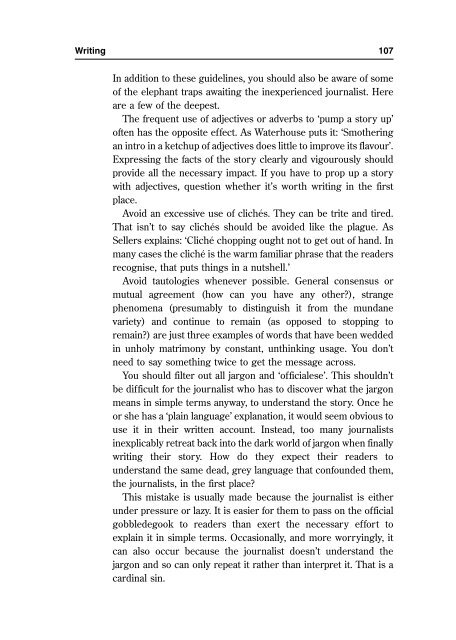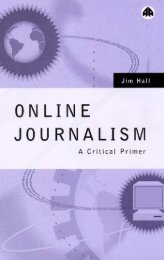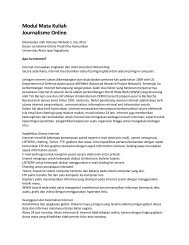1What is online journalism? - Ayo Menulis FISIP UAJY
1What is online journalism? - Ayo Menulis FISIP UAJY
1What is online journalism? - Ayo Menulis FISIP UAJY
Create successful ePaper yourself
Turn your PDF publications into a flip-book with our unique Google optimized e-Paper software.
Writing 107<br />
In addition to these guidelines, you should also be aware of some<br />
of the elephant traps awaiting the inexperienced journal<strong>is</strong>t. Here<br />
are a few of the deepest.<br />
The frequent use of adjectives or adverbs to ‘pump a story up’<br />
often has the opposite effect. As Waterhouse puts it: ‘Smothering<br />
an intro in a ketchup of adjectives does little to improve its flavour’.<br />
Expressing the facts of the story clearly and vigourously should<br />
provide all the necessary impact. If you have to prop up a story<br />
with adjectives, question whether it’s worth writing in the first<br />
place.<br />
Avoid an excessive use of clichés. They can be trite and tired.<br />
That <strong>is</strong>n’t to say clichés should be avoided like the plague. As<br />
Sellers explains: ‘Cliché chopping ought not to get out of hand. In<br />
many cases the cliché <strong>is</strong> the warm familiar phrase that the readers<br />
recogn<strong>is</strong>e, that puts things in a nutshell.’<br />
Avoid tautologies whenever possible. General consensus or<br />
mutual agreement (how can you have any other?), strange<br />
phenomena (presumably to d<strong>is</strong>tingu<strong>is</strong>h it from the mundane<br />
variety) and continue to remain (as opposed to stopping to<br />
remain?) are just three examples of words that have been wedded<br />
in unholy matrimony by constant, unthinking usage. You don’t<br />
need to say something twice to get the message across.<br />
You should filter out all jargon and ‘officialese’. Th<strong>is</strong> shouldn’t<br />
be difficult for the journal<strong>is</strong>t who has to d<strong>is</strong>cover what the jargon<br />
means in simple terms anyway, to understand the story. Once he<br />
or she has a ‘plain language’ explanation, it would seem obvious to<br />
use it in their written account. Instead, too many journal<strong>is</strong>ts<br />
inexplicably retreat back into the dark world of jargon when finally<br />
writing their story. How do they expect their readers to<br />
understand the same dead, grey language that confounded them,<br />
the journal<strong>is</strong>ts, in the first place?<br />
Th<strong>is</strong> m<strong>is</strong>take <strong>is</strong> usually made because the journal<strong>is</strong>t <strong>is</strong> either<br />
under pressure or lazy. It <strong>is</strong> easier for them to pass on the official<br />
gobbledegook to readers than exert the necessary effort to<br />
explain it in simple terms. Occasionally, and more worryingly, it<br />
can also occur because the journal<strong>is</strong>t doesn’t understand the<br />
jargon and so can only repeat it rather than interpret it. That <strong>is</strong> a<br />
cardinal sin.
















